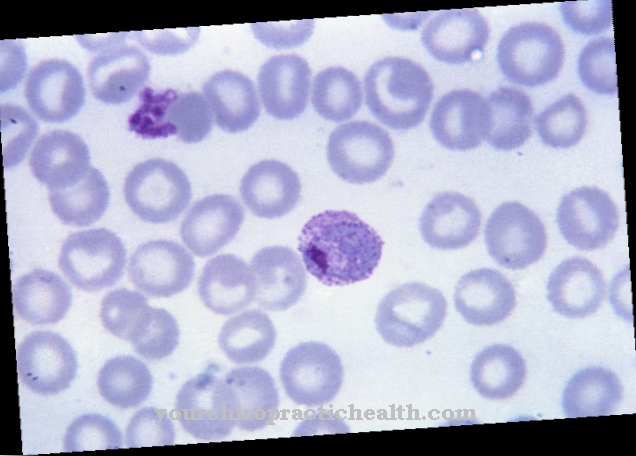Enterococcus faecium is a bacterium that belongs to the enterococcal family and is found in the human intestinal flora. Outside the intestinal tract, it can cause symptoms such as urinary tract infections. It is used in pharmacy to rebuild a disturbed intestinal flora.
What is Enterococcus faecium?
Behind the name Enterococcus faecium hides a bacterium that is part of the human intestinal flora. It belongs to the enterococcal family. These are relatives of the streptococci, but differ from them in some essential ways.
Enterococcus faecium is found not only in human and animal organisms, but also in the environment (for example in the soil or in sewage). It often occurs in pairs or in the form of a chain. In principle, Enterococcus faecium does not cause any symptoms. However, it can cause some diseases if found outside of the intestinal tract.
These can be difficult to treat as the bacterium quickly becomes resistant to antibiotics. In pharmacy, strains of Enterococcus faecium are used for various disorders and complaints.
Meaning & function
Enterococcus faecium is a bacterium that occurs naturally in human and animal organisms. It is an integral part of the human intestinal flora and thus contributes to the fact that the bacteria balance in the intestinal tract remains balanced and optimal digestion can take place.
Under certain circumstances it can develop into the main germ of the intestinal flora, which happens especially if the person concerned takes antibiotics as a result of a bacterial infection. Due to its properties, the bacterium is able to survive in the body even under difficult conditions. It is very resistant and can also stay alive in the bile or even multiply under the prevailing circumstances (the bile has a hydrochloric acid content of around 6.5% inside).
Even temperature increases of up to 60 ° C have no negative effect on Enterococcus faecium for a short time. If, for example, the intestinal flora of a patient is disturbed, the attending physician can prescribe living bacteria of an Enterococcus faecium strain in capsule form in order to restore the balance in the intestine.
Such an application is also possible with severe diarrheal diseases. In most cases, Enterococcus faecium does not cause disease or health problems if it is not found outside the intestinal tract.
Diseases
Basically is Enterococcus faecium not a bacterium that causes disease or health problems to a large extent. However, this only applies if its occurrence is limited to the intestinal tract.
If the bacterium occurs outside of this region, it can cause urinary tract diseases such as bladder infections or endocarditis (inflammation of the lining of the heart) and inflammation of the gallbladder (cholecystitis) in people with a weakened immune system. Enterococcus faecium is also known to a particular extent as a cause of so-called nosocomial infections (also known as hospital infections).
This is an infection that a patient gets during a hospital stay and which had not yet existed at the time of admission. Nosocomial infections involving Enterococcus faecium are not uncommon, particularly after operations on the intestine. Statistics say that around 10% of all known cases are due to Enterococcus faecium.
The related bacterium Enterococcus faecalis is responsible for the infections even more often (in up to 90% of cases). If an infection with Enterococcus faecium occurs as a trigger, it is very difficult to treat in many cases. The bacterium is naturally highly resistant to numerous substances that are used in medicine as antibiotics.
When treating the present infection, care must be taken to use alternative substances. However, here too there is a risk that Enterococcus faecium will quickly develop resistance to the respective antibiotic. Often the antibiotic has to be changed several times in the course of therapy in order to achieve the desired effect and to bypass existing or newly developed resistances.

























.jpg)


